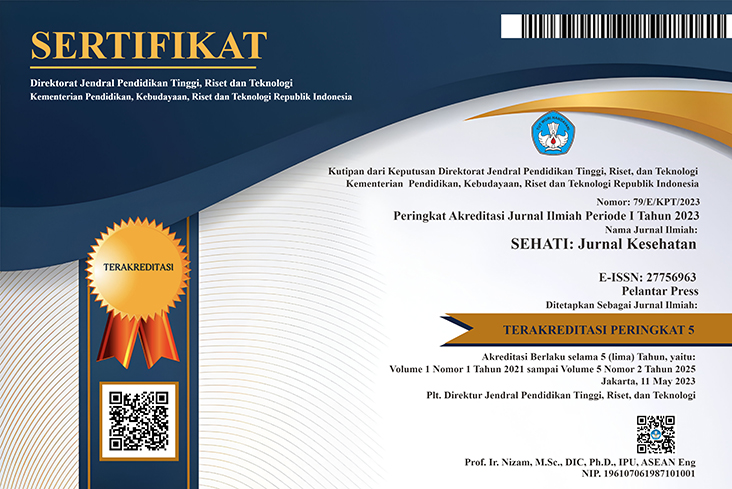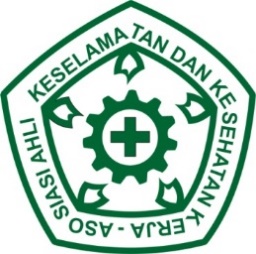Hubungan faktor lingkungan fisik, sosial dan ekonomi dengan kejadian Tuberkulosis Paru di Kecamatan Tambang Kabupaten Kampar
Abstract
Pulmonary tuberculosis is an infectious disease caused by Mycobacterium tuberculosis which mostly attacks the lungs and can also attack other organs. Tuberculosis is transmitted by smear positive tuberculosis patients, Tuberculosis germs are transmitted through the air when the patient coughs and sneezes so that the germs spread in the air in the form of droplets (sputum sparks), so people can become infected if they inhale the droplet into the respiratory tract (Ministry of Health Republic of Indonesia, 2014 ). According to Achmadi (2010) risk factors for tuberculosis transmission are environmental and behavioral factors. Environmental factors include ventilation, occupancy density, temperature, lighting and humidity. Whereas behavioral factors include smoking, spitting or sputum in any place, coughing or sneezing not closing the mouth and habit of not opening the window. Based on the results of a survey in Indonesia by the Directorate General of Communicable Disease Eradication and Environmental Health (2011), the high incidence of pulmonary TB is caused by a lack of knowledge. Knowledge of tuberculosis sufferers will affect the attitude and behavior such as throwing up spit or sputum that can be carelessly a source of transmission for people around him. Prabu in Fitriani (2013) explained that family heads who have an income below the regional minimum wage (UMR) will consume foods with nutrient levels that are not in accordance with the needs of each family member so that they have an nutritional status that is lacking and will make it easier to contract infectious diseases including Lung TB. According to WHO the number of cases of tuberculosis is ranked above HIV / AIDS. In 2016 there were an estimated 10.4 million new cases of tuberculosis or 142 cases / 100,000 population, 60% of new cases occurred in 6 (six) countries namely India, Indonesia, China, Nigeria, Pakistan and South Africa, and Indonesia ranked second (WHO Global Tuberculosis Report, 2017). Based on data on Indonesia's health profile in 2018 the number of tuberculosis cases in Indonesia in 2017 was 420,994 cases and increased in 2018 to reach 511,873 cases (Ministry of Health Republic of Indonesia, 2018). The number of pulmonary tuberculosis in Riau Province in 2018 is 11,135 cases (Ministry of Health of the Republic of Indonesia, 2018). Based on data on the health profile of Kampar Regency in 2017, tuberculosis is an environmentally-based direct infectious disease that ranks second with a total of 1,071 cases after diarrheal disease with a total of 1,076 cases. The number of positive AFB cases in 2017 in Kampar District reached 1071 cases, with the highest number of sufferers found in Tambang District, 78 cases. In 2018 the number of TB cases was 1079 cases, with the highest cases also occurring at the Tambang Health Center with a total of 67 cases and 43 new cases, followed by the Siak Hulu I Health Center with a total of 57 cases (Dinkes District Health Office, 2018). Based on this, this study aims to analyze and the risk of the relationship between the physical, social and economic environment with the incidence of pulmonary tuberculosis in Tambang District, Kampar Regency.
Keywords
Full Text:
PDFReferences
Achmadi, U. 2010. Manajemen Penyakit Berbasis Wilayah. Universitas Indonesia. Depok.
Anggraeni, K. 2015. Hubungan Kualitas Lingkungan Fisik Rumah dan Perilaku Kesehatan dengan Kejadian TB Paru di Wilayah Kerja Puskesmas Gondanglegi Kecamatan Gondanglegi Kabupaten Malang. Jurnal Kesehatan Masyarakat (E-Journal), Vol 3 No 1.
Dinkes Kab.Kampar (Dinas Kesehatan Kabupaten Kampar). 2018. Profil Kesehatan Kabupaten Kampar Tahun 2018. Kampar.
Direktorat Jenderal Pengendalian Penyakit dan Penyehatan Lingkungan. 2011. Strategi Nasional Pengendalian TB di Indonesia 2010-2014. Jakarta.
Fitriani, E. 2013. Faktor Risiko yang Berhubungan dengan Kejadian Tuberkulosis Paru (Studi Kasus di Puskesmas Ketanggungan Kabupaten Brebes). Unnes Journal of Public Health Epidomiology Vol 2 No 1.
Kemenkes RI (Kementerian Kesehatan Republik Indonesia). 1999. Keputusan Menteri Kesehatan Republik Indonesia Nomor 829/Menkes/SK/VII/1999 tentang Persyaratan Kesehatan Perumahan. Depkes RI. Jakarta
DOI: https://doi.org/10.52364/sehati.v1i1.4
Refbacks
- There are currently no refbacks.
Copyright (c) 2021 Pelantar Press

Ciptaan disebarluaskan di bawah Lisensi Creative Commons Atribusi-NonKomersial 4.0 Internasional.




